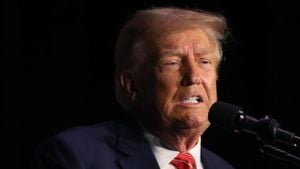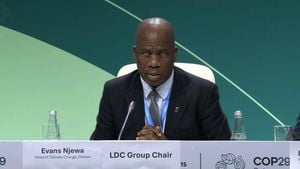Diljit Dosanjh, the acclaimed Punjabi singer and actor, is no stranger to performing for enthusiastic crowds and facing occasional controversies. His recent shows as part of the much-anticipated "Dil-Luminati Tour" have garnered both acclaim and scrutiny. Ahead of his planned concert at Hyderabad's Ranga Reddy district on November 15, 2024, he found himself at the center of governmental oversight when the Telangana state authorities issued strict directives aimed at ensuring the well-being of attendees and respecting community standards.
The notice, dispatched by the Department of Welfare of Women and Children, Disabled and Senior Citizens, reflects growing concern about the influence of popular music on societal behavior—particularly concerning songs categorized as promoting drugs, alcohol, and violence. The state's directive explicitly warned Dosanjh and his team to refrain from performing songs of this nature during the concert. This government intervention was reportedly spurred by complaints from social activist Panditrao Dharenavar, who presented video evidence of prior performances featuring lyrics related to substance abuse and violent themes.
“You are directed not to use children during your live show where peak sound pressure level is above 120 dB,” the directive stated, underscoring safety issues related to high-decibel levels likely to impact younger audiences. Children under 13 years old were highlighted as particularly vulnerable, as exposure to loud music can be harmful to their development.
This legal notice stands as part of broader societal discourse on the ramifications of pop culture, especially within the Indian artistic community. Critics and government officials point to the potential detrimental impacts of glorifying substance use and violence, particularly on impressionable youth. Social media reactions have been mixed, with some applauding the authorities’ proactive stance and others questioning the feasibility of government regulation over entertainment content. One social media user exclaimed, "Then why is liquor consumption legal in India?" highlighting the contradictory nature of existing laws versus cultural expressions.
It’s worth noting this isn’t the first time Dosanjh’s performances have invited scrutiny. Just last month, during his concert at Jawaharlal Nehru Stadium, there were complaints concerning the aftermath of the event, including concerns voiced by local athletes about stadium conditions post-performance. Yet, amid mounting scrutiny, Dosanjh’s response to the legal notice has been minimal, raising questions about his approach to balance artistic expression with regulatory compliance.
Dosanjh, who boasts millions of fans and has made significant contributions to both music and film, is expected to navigate these restrictions carefully as his tour proceeds through multiple Indian cities, including Ahmedabad, Lucknow, Pune, and Kolkata. His upcoming performances are nonetheless anticipated to set new attendance records, with advance tickets reportedly selling out within minutes upon release on platforms like Bandsintown.
Despite the legal hurdles, the Hyderabad concert looks to proceed as planned, though closely monitored by authorities to align with stated guidelines concerning lyrical content and audience safety. This confluence of artistic freedom and regulatory oversight encapsulates the current tensions within India's vibrant entertainment sector, reflecting societal values juxtaposed against the realities of pop culture.
Beyond the restrictions and discussions surrounding drug references and violence, the phenomenon of Diljit Dosanjh’s concerts cannot be overlooked as he strives to maintain his reputation as one of the most dynamic performers on the Indian scene. Whether or not these measures dampen the spirit of his music—known widely for evoking joy and celebration—remains to be seen as fans await what promises to be another spectacular show, albeit under the weight of governmental oversight.
Fans of the Punjab singer are left to ponder how these circumstances might influence the atmosphere of the concert experience and the broader conversation about what messages should be endorsed by artists. The interplay of governmental directives, audience expectations, and the creative liberties of artists continues to shape the narrative surrounding cultural events such as this, echoing larger societal concerns about the content of entertainment and its potential impact on community standards.
With the concert around the corner, the spotlight remains on Diljit Dosanjh—a multifaceted entertainer caught at the crossroads of artistic freedom and societal expectations. Will he adapt his performance style to comply with the legal notice, or will he stay true to the roots of his music? Fans will not have to wait long to find out as the vibrant energy of his concerts is set to erupt across multiple venues after the Hyderabad event.



